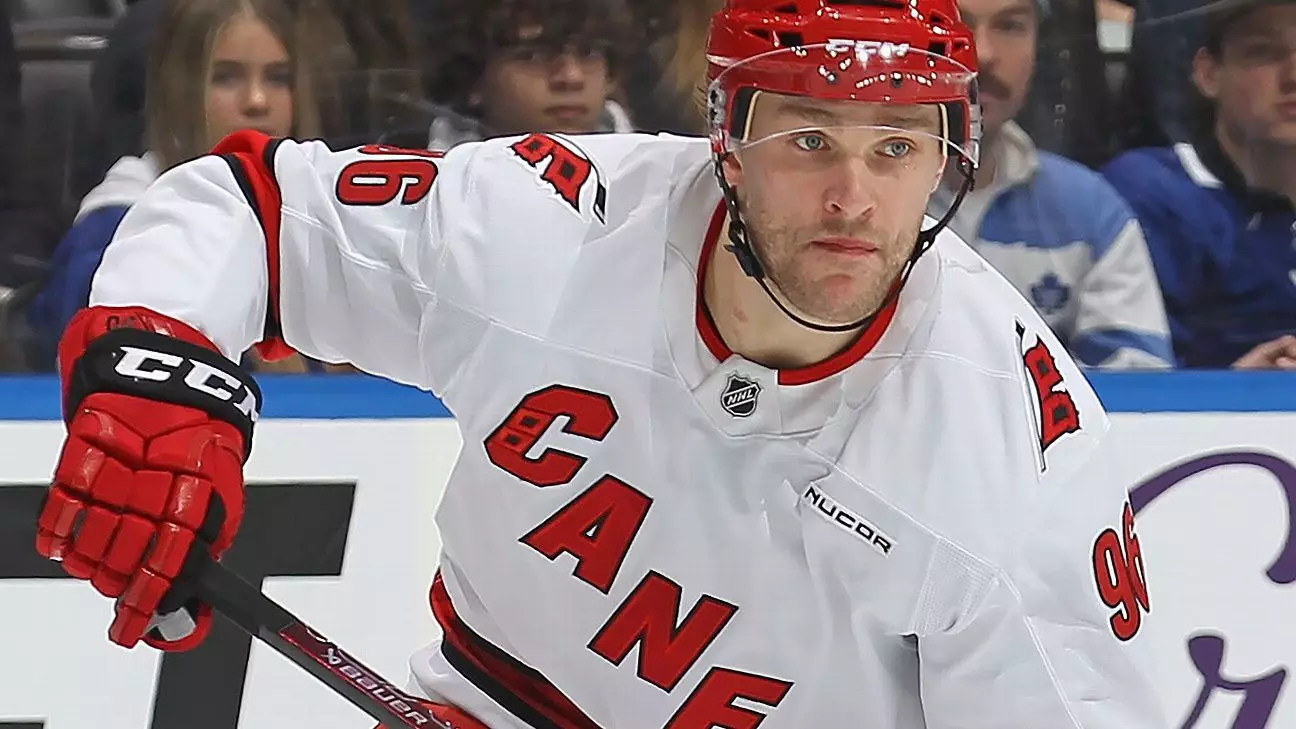In the fast-paced world of the NHL, where the margins between success and failure are razor-thin, taking calculated risks is paramount. Carolina Hurricanes’ general manager Eric Tulsky epitomizes this principle as he embarks on reshaping his team. Recent events surrounding star winger Mikko Rantanen have made it abundantly clear that Tulsky’s approach is fueled by an aggressive mindset that prioritizes long-term vision over temporary setbacks. By trading for Rantanen only to later move him again, Tulsky showcases not only his willingness to take risks but also his commitment to seizing opportunities when they arise.
Tulsky’s assertion that an organization characterized by aggressiveness must embrace risk speaks volumes about the culture he aims to cultivate within the Hurricanes. In an era where teams cling to conservative strategies in hopes of maintaining stability, Tulsky is shaking things up, understanding that true progress demands bold moves. He argues, “If the team was already winning [Stanley] Cup after Cup after Cup, maybe that would be a time to be conservative, but we haven’t gotten to where we want to be yet.” This acknowledgement of the challenges ahead lays the groundwork for a mentality that could push the Hurricanes into championship contention.
The Rollercoaster Journey of Rantanen
Rantanen’s saga illustrates the unpredictability inherent in NHL trades. Plucked from the Colorado Avalanche in a multifaceted, blockbuster deal, Rantanen’s stint in Carolina was, unfortunately, underwhelming. Scoring just six points in 13 games, he struggled to find his footing amidst a whirlwind of changes. This serves as a stark reminder that star power does not always translate to immediate success, particularly when a player is thrust into an unfamiliar environment.
There lies a critical lesson beneath Rantanen’s transition from Colorado to Carolina; sometimes, a star player simply does not acclimate to a new location and system as quickly or seamlessly as expected. His brief time with the Hurricanes can perhaps be viewed as a cautionary tale against impulsive trades built more on potential than performance.
While Tulsky explored the possibility of extending Rantanen’s contract, it became apparent that the forward did not feel a strong connection to Carolina, despite the lucrative offers on the table. Rantanen’s reluctance to commit highlighted the vital aspect of player fit within a team—a factor that resonates beyond mere financial compensation. Tulsky aptly noted, “My sense of it was that this just didn’t feel like home for him.” Such introspection is crucial, as Tulsky navigates the intricate dynamics of team chemistry alongside roster adjustments.
The Dallas Deal: A New Opportunity?
The trade that ultimately sent Rantanen to the Dallas Stars was not merely a reaction to a player who felt out of place but a calculated move addressing the long-term interests of the Hurricanes. By securing significant draft capital in return for Rantanen, Tulsky opted for a strategy that places future development at the forefront. Aiming to rebuild while still contending, the Hurricanes now have a treasure trove of assets at their disposal.
Dallas’s willingness to offer a robust package for Rantanen reflects the forward-thinking mentality that many organizations are adopting. As Rantanen himself signed an eight-year contract extension with an annual average value of $12 million, it underscored his value as a sought-after player despite his mixed performance in Carolina. For the Hurricanes, parting ways was not a concession of defeat; rather, it was the initiation of a new chapter filled with potential upside.
Tulsky acknowledged that while trading Rantanen was not the original goal, the offers received were too promising to ignore. Praising the growing talent of incoming prospect Logan Stankoven, he emphasized how the draft picks could shape the future of the franchise, even if it came at the expense of missing imminent fixed assets for the current season.
Building for the Future
Tulsky’s reflections reveal a resolute commitment to the long-term vision of the franchise. He is acutely aware that some decisions may lack immediate payoff yet lay the groundwork for future success. The previous season’s failure to sign star winger Jake Guentzel serves as a painful reminder that elite assets might not always align with the franchise’s vision, but Tulsky remained undeterred. He confidently articulates, “We’ve got a lot of high-end players that have signed here long term.” It is a testament to his belief in Carolina’s direction as a viable destination for top-tier talent.
In a sport where missteps can lead to dire repercussions, Tulsky’s philosophies invite scrutiny. Yet, his unwavering conviction in making bold moves is necessary for a franchise on the cusp of greatness. As the Hurricanes evolve, they continue to balance the immediacy of competition with the wisdom of strategic growth. In Tulsky’s world, risks are not simply facts of life but essential components of a grander aspiration—meeting the ultimate goal of hoisting the Stanley Cup.


Leave a Reply